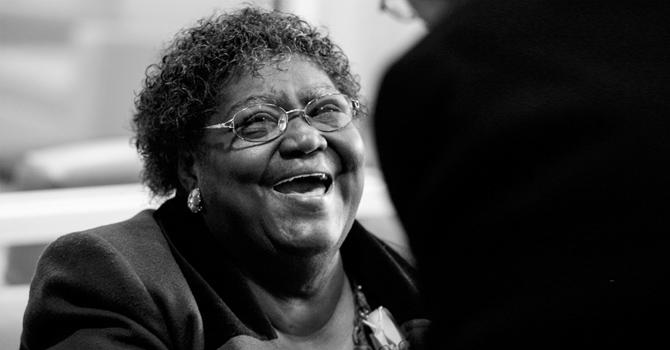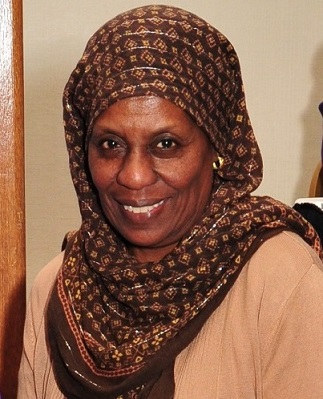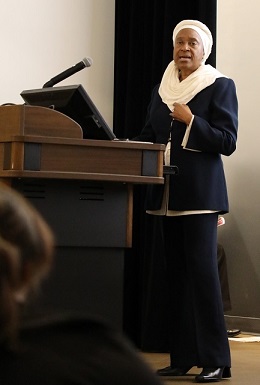Durham Tech employees remember Ann Atwater

As the much-awaited movie premiere of “The Best of Enemies” occurs this week, some Durham Tech employees spoke about the film’s protagonist and longtime Durham civil rights activist Ann Atwater.
Atwater devoted decades of her life to fighting for change for Durham’s African-American community. She will be portrayed by Taraji P. Henson in the “The Best of Enemies,” which will premiere in Durham on March 19.
Naomi Feaste, an Instructor in the High School Equivalency Diploma program at Durham Tech, said she has seen Durham evolve throughout the years and credits community progress to the unabated work of those like Atwater.
Feaste said she knew of Atwater’s work for years before she personally met the activist.
In the 1990s, Feaste said she was working with the local nonprofit Cultural Enrichment Services. Atwater’s community group partnered with the nonprofit for a project to benefit the youth in Atwater’s neighborhood. Specifically, Atwater wanted to plan some summer activities for the kids.

Over the course of several meetings, the two organizations landed on projects such as videography and jewelry design. The kids produced a video featuring residents talking about their community.
“Working directly with her was enjoyable because I got more of a chance to see directly how she really cared about her community, about the people in the community, about the children,” Feaste said.
Atwater moved to Durham in 1953 and began participating in Operation Breakthrough soon after it was founded in 1964. The organization was dedicated to addressing poverty and inequality in Durham.
Feaste, who also worked for the organization, recalled Atwater and others fighting against discrimination in housing, employment problems, and absentee landlords.
“They were very influential I would say,” Feaste said. “They were not afraid to approach those who were in authority and in power to insist on providing a better quality of life for the people of Durham.”
Feaste described Atwater as warm and caring but also very firm.
“I had a lot of respect for her. I admired her strength and her commitment … to her mission of making life better for her people and for her community,” she said. “She saw a need. She saw problems, and she seemed to have committed herself to find solutions to problems. That, to me, is a lesson that we all could benefit from in terms of what we do with our time, with our life, how we move through life.”
Aisha Abdul-Ali, an Administrative Assistant for First-Year Experience at Durham Tech, also said she recalled Atwater’s strong presence.
“I remember Ms. Atwater, as everyone called her in Durham as they met her and got to meet her. She was truly a champion of civil rights,” she said. “She was a champion of young people to become socially conscious and participate at the level that they felt comfortable with.”

Abdul-Ali was a sophomore at North Carolina Central University when she first met Atwater, but she later marched and protested on the streets of Durham with Atwater. She also spent time with Atwater during her later years.
Abdul-Ali said Atwater was committed to teaching young people about their current lives and about their future years to come. Many of them become lifelong friends, she said.
“To sit with her toward the latter part of her life and to listen to her reflection then, those are the things you never forget,” Abdul-Ali said.
Atwater received numerous accolades for her work, including Rosa Parks presenting her with the national Women in Community Service (WICS) Rosa Parks Award and being recognized by the Durham NAACP.
The activist died June 2016, at the age of 80. Feaste was among those who attended the funeral services, coming to the viewing before the official funeral.
“I just felt a need to give her that respect,” Feaste said.
The movie “The Best of Enemies” depicts Durham in 1971, when Atwater faced off with Ku Klux Klan leader, C.P. Ellis, over school integration. It is inspired by Osha Gray Davidson’s 1996 book “The Best of Enemies: Race and Redemption in the New South.”
The movie will make its Durham premiere at the Carolina Theatre on March 19 followed by a screening and panel discussion at Duke University on March 20. Both screenings are sold out.
The movie will be released nationwide on April 5.
“It was that generation of people who really helped to bring about change in Durham,” Feaste said. “They were very firm in their convictions and very firm in working to see change in Durham. … Ms. Atwater was one among many who helped to make Durham what it is today.”

